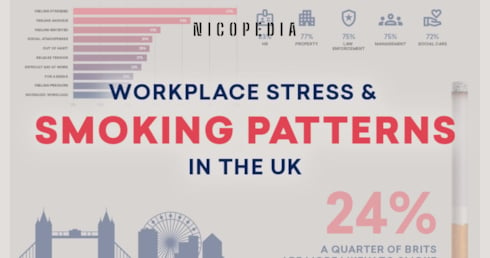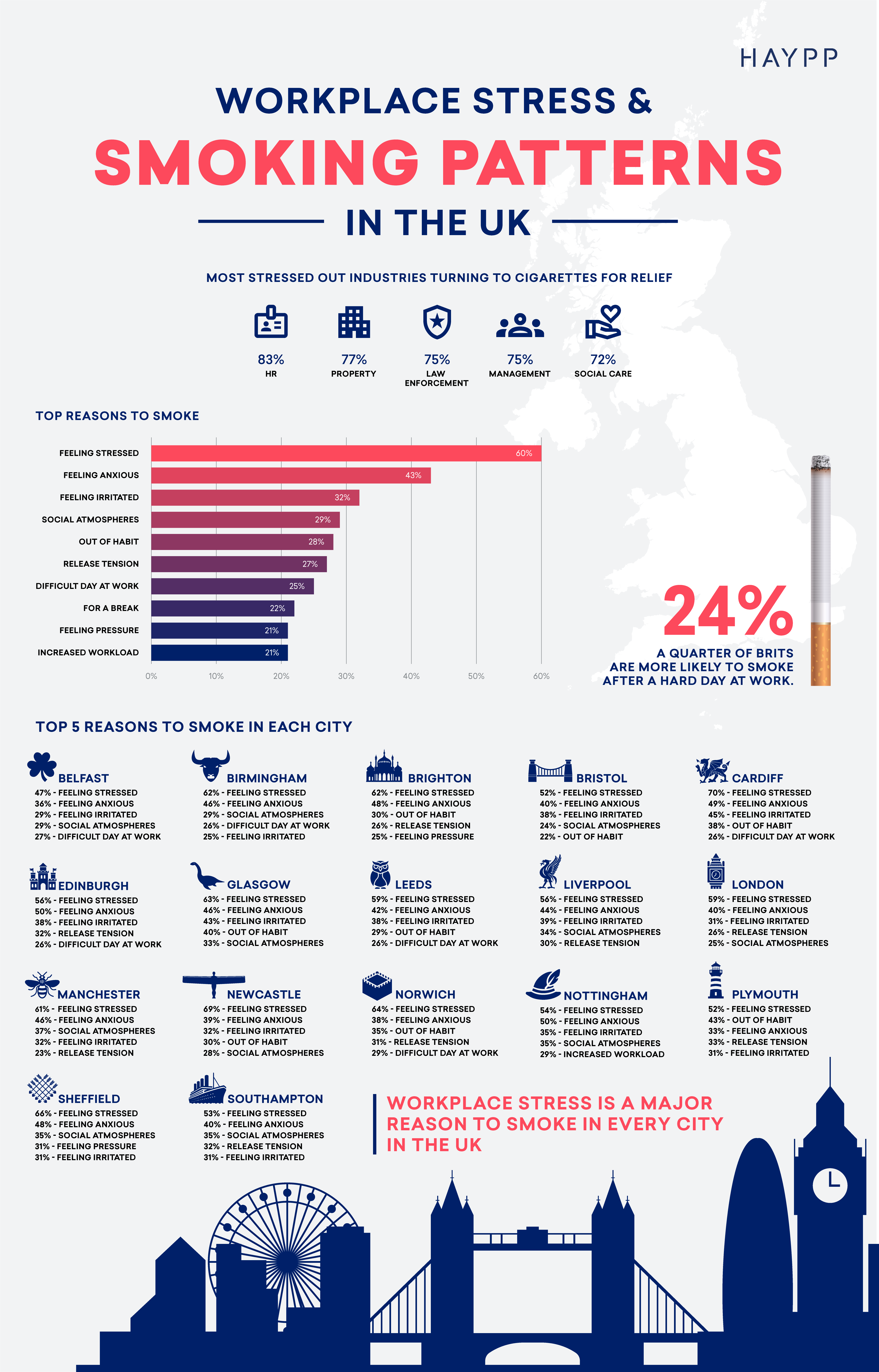Published 2024-05-28
Workplace Stress and Smoking Patterns
Recent data shows that one in eight UK adults still smoke – a considerably alarming statistic! With this in mind, Haypp decided to conduct research into which professions have the highest rate of smokers in the UK, on both a national and local level. Are certain industries naturally home to a higher number of smokers and, if so, what makes them keep coming back to cigarettes? With ~4,000 respondents spanning 18 cities, we've uncovered a clear connection between workplace pressure and smoking rates, learning which aspects of the job are causing Brits to turn to tobacco for relief. Click around the infographic below to explore how different cities and industries stack up.

Top 5 Causes of Work-Related Smoking
Stress: 60% of the UK workforce listed stress as the key influencing factor for how much they smoke. 35% said that smoking helps relieve their stress at work and 40% said that the amount they smoke increases exponentially with the amount of stress they experience in their work day. All in all, this illustrates how smoking has become an unhealthy way of dealing with stress in the workplace.
Anxiety: 43% of those surveyed said they smoke as a means of coping with anxious thoughts and feelings. This points towards the prevalence of workplace anxiety, but also a lack of accessibility to mental health support on-the-job.
Irritation: 33% of those surveyed say they smoke more when they are irritated. The association here highlights a close link between smoking and dealing with negative emotions like frustration and annoyance at colleagues or a particular work situation.
Social atmosphere: UK smokers are more likely to light up a cigarette when they feel peer pressure or the need to fit in with others, since 29% of people said this actively influences their tobacco intake.
Out of habit: 27% of people said they smoke out of habit, which reinforces the addictive nature of smoking as well as the lack of awareness of tobacco-free alternatives that are available.
Top 5 Professions Addicted to Smoking
Real Estate: When it comes to industries most affected by smoking, real estate agents and those working in the property sector are by far the most prolific in the UK, with 55% of those surveyed admitting to smoking every day. Nearly 40% associate increased workload with smoking, so we can assume there is some connection between big sales and working based on commission that leads to stress and smoking.
Construction: Nearly half of the builders and construction workers in the UK smoke (48%), and even more of them reported that smoking was a work-related stress symptom (65%). A quarter said they smoke more when there is a lot to do, indicating a connection between physically demanding work and the tendency to take smoke breaks.
Social Care: The third-biggest sector of smokers in the UK are those working in social care, as 47% of social workers consider themselves regular smokers. It's easy to draw a link here between jobs focused on helping others and higher smoking rates, as this sort of work often takes a heavy emotional toll and there's a need to unwind after a long day.
Hospitality: 44% of hospitality workers admit to smoking with 62% listing stress as a key influence on their smoking habits and 43% stating workplace anxiety as the main driver. This adds up when you consider the fact that people working in bars, restaurants and hotels, for instance, often have to deal with long shifts at irregular hours in a fast-paced environment – not to mention demanding customers.
Management: It seems 44% of those in managerial roles in the UK also smoke daily, with a shocking 75% of respondents saying they smoke more when they're stressed at work, which is higher than any other profession. This is most likely caused by the high degree of responsibility and multitasking required as a manager.
Top 5 Cities
- Cardiff: 14% of Cardiff healthcare workers admit to smoking on a daily basis which could be connected to the ageing population.
- Norwich: On-site labourers in Norwich are feeling the stress with almost 12% of smokers also belonging to the construction industry.
- Sheffield: The unemployed in Sheffield appear to be experiencing the stress of job searching with a fifth of smokers currently unemployed.
- Glasgow: 13% of smokers in Glasgow work in Hospitality and Events, which could be connected to the city’s recent boom in tourism.
- Newcastle: Almost a fifth of those in Newcastle who smoke currently work in healthcare, illustrating the demands of working in the NHS.
What These Smoking Statistics Reveal
The UK government has made great strides in reducing smoking over the years, but it’s clear that more can and should be done. These survey results draw a connection between workplace stress and smoking, meaning that employers now have a bigger role to play when it comes to reducing smoking rates within their teams.
As well as managing employee stress levels and workload, there should be better awareness of the mental health support systems on offer, like regular check ins or access to counselling. From our survey we can see that smoking shouldn't be normalised at office events or afterwork gatherings either, since this can expose people to passive smoke or unknowingly contribute to the social pressure of accepting a cigarette to "fit in."
Employers should also lead by example when it comes to promoting healthier habits as a way of unwinding after a long day or taking a break. Of course, transitioning to smoke-free alternatives such as vapes or nicotine pouches that are proven to be less harmful than cigarettes could also be an option to minimise the negative consequences of smoking.

Related articles




